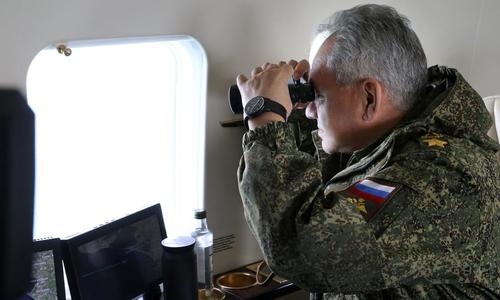Russia Tells West All Troops Now “Back At Permanent Bases” After Ukraine Buildup
Russia’s military has announced that all additional previously deployed troops to the country’s south and southwest – which had sparked a ‘new Ukraine crisis’ late last month into this month – have now returned to their home bases. This month’s “massive drills” had alarmed Kiev’s allies in the West, and set off a series of tit-for-tat escalating diplomatic expulsions which began when Washington booted ten Russian consular officials (along with Biden’s sanctions for the SolarWinds hack and assorted election meddling claims), so it appears the Kremlin is taking pains to inform the West there is no feared ‘offensive’ in the works against Ukraine.
Russia’s defense ministry had never made it a secret that large-scale, nationwide ‘readiness’ drills would commence early this month. While what was described as a “massive inspection” of military units stretching from the Northern Fleet in the Far North, and to the Kuril Islands and Kamchatka, down to Crimea and near Ukraine’s eastern border in the South, involved hundreds of thousands of troops across the nation, it was the southern build-up which drove world headlines. This in large part because Kiev saw in it a prelude to invasion of its eastern Donbass region amid a severe uptick in fighting between Russian-backed separatists and Ukrainian national forces that led to multiple Ukrainian troop deaths.
The Associated Press reports the following of the latest Russian military update: “Gen. Valery Gerasimov, the chief of the military’s General Staff, said that more than 300,000 troops, nearly one-third of the nation’s 1 million member military, took part in the exercise earlier this month.”
It remains unclear what portion of this 300,000 was deployed to Crimea and near Ukraine. Speculation ranged from the low and mid tens of thousands to 100,000 or more. “Speaking during a meeting with the top military brass to discuss the drills, he noted that they involved 35,000 combat vehicles, about 900 aircraft and 180 navy ships,” the AP continues of Gen. Gerasimov’s statement.
“The commander of the Western Military District, Col. Gen. Alexander Zhuravlev, reported that most of his troops are now back at their garrisons, and just one trainload of troops was still on its way to their home base.”
So it now definitively appears “crisis averted”…at least for now. But the reality is this whole April episode has sunk US-Russia relations to new lows. As Russian Foreign Minister Sergei Lavrov put it in a Wednesday televised interview, the “lack of mutual respect” and “lack of communications” and diplomacy have now reached levels “worse” than the Cold War. “During the Cold War, the tensions were flying high and risky crisis situations often emerged, but there was also a mutual respect,” the top Russian diplomat said. “It seems to me there is a deficit of it now.”
All of this means that during the next inevitable round of Russia-Ukraine tensions and military build-up (given especially the Donbass situation is still boiling, with no resolution in sight), the stakes will be even higher, causing fingers to more easily be on the trigger. As a case in point the European Parliament on Thursday passed a resolution which seeks to require the EU to impose severe far-reaching penalties on Russia in any future case of “aggression” against Ukraine’s sovereignty.
Here’s what the European Parliament said in a press release: “Should military build-up lead to an invasion of Ukraine by Russia, the EU must make clear the consequences for such a violation of international law and norms would be severe, MEPs agreed.”
“Such a scenario must result in an immediate halt to EU imports of oil and gas from Russia, the exclusion of Russia from the SWIFT payment system and the freezing of assets and cancellation of visas for Europe of all oligarchs tied to the Russian authorities,” it said.
The Kremlin has said that these theoretical actions would constitute an “act of war” – again which means the next Ukraine crisis will more easily lead to direct conflict.
Tyler Durden
Sat, 05/01/2021 – 09:55
via ZeroHedge News https://ift.tt/3xBVi0l Tyler Durden
